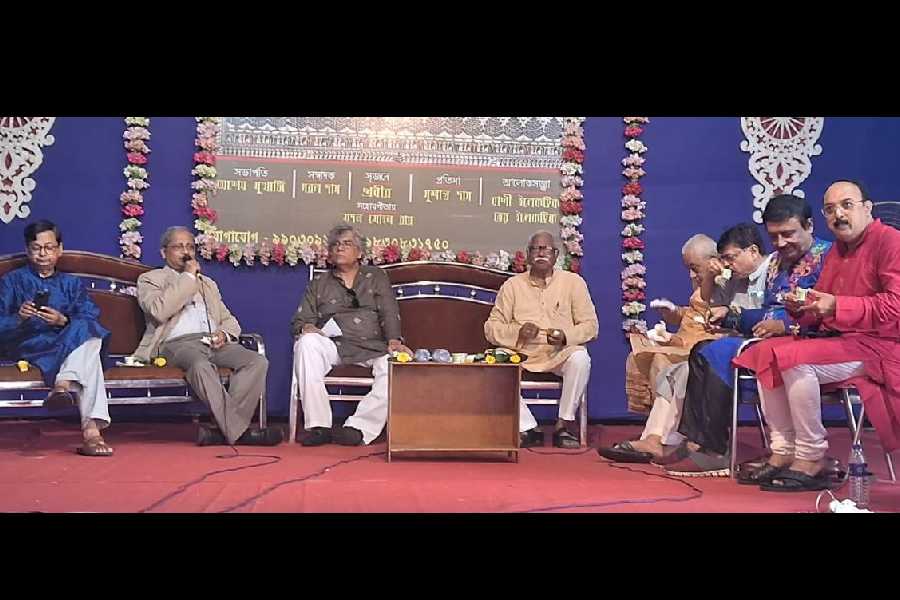Navami morning in BK Block began with a celebrity adda session on the topic of Pujas now and then.
“Adda, as a concept, has often been treated negatively. In the 70s and 80s, rok-er adda was looked down upon as a social evil,” began Chandrasekhar Bag, who moderated the event. “Now people are more relaxed and less judgmental about it.”
“We cannot always say that everything in the past was good. There are good things in the present as well. We have to look at things from a modern perspective to understand why the current generation is doing things differently. Their station in life is different from what ours used to be at their age,” asserted retired bureaucrat Debasish Sen, a resident of CE Block.
Consultant dermatologist Imran Wali has always found Durga puja to be like any other festival. “We have been associated with Puja for decades and never felt like it was imposed on us. These days, there is a lot of politics in pujas around us but earlier, everything was simple.”
Most speakers talked about their childhood and how they spent the Pujas with near and dear ones. “When I was a student, my relatives used to come to our house, or we used to visit them. All the elders would sit and talk for hours, and we children played with whatever we could find,” said Prof Rajagopal Dhar Chowdhury. “Sometimes we even sat down and listened to their stories, which enriched our imaginations. But today, how many people visit relatives during Puja? Worse still, how many stay in touch with their relatives? Visiting relatives has gone out of fashion.”
Others pointed out that many people had moved out of the city and that no one really has time to go and visit one another. In fact, rituals such as Vijaya-r pranam and Vijaya-r bhuri bhoj have been replaced by WhatsApp messages and a rare phone call.
Another speaker, Captain Amalendu Ray Chowdhury (Retd.) shared his thoughts on the art, craft, and nostalgia of the festival.
Arindam Acharya of West Bengal Police emphasised how he visited several countries during the year but always came home for Puja. He even composed a song on the spot to portray his emotional attachment to the people of Bengal. “No matter how much organisers abroad try to make us feel like we are in Bengal, the sweetness of the city and its people are missing outside. I never want to be away from Bengal again. There have been times when I have received news of some miscreants planning to snatch gold jewellery and create trouble during the night during Puja. I have been on patrol at all hours with my men,” he said.
On one such occasion, Acharya was walking behind a family of four who were pandal-hopping at night. “The son was telling the father that he wanted a haircut like Kartik, the daughter was telling him she wanted to dress like Saraswati, while his wife warned him that if he failed to buy her a gold necklace like the one Ma Durga was wearing, she would never cook for him again! Imagine what has society come to!” he concluded as the audience rolled in laughter!
Former head of the CBI Upendra Nath Biswas pointed out that these days people indulged more in celebrations rather than the ritual itself. “Shobtai jeno utsab; pujo kothao nei. Aar thakleo sheta thik bhoktir jaiga theke noi. Earlier, we spent a lot of time in and around the pandals participating in decorations, serving prasad and helping elders put everything together for the rituals. These days, people just drop in at the para pandal, exchange pleasantries, and leave. Even those who come for community bhog, sindur khela or bisarjan, do so to click photographs for social media,” he said.
“Previously, we bought new clothes only for the Pujas, but now people buy clothes throughout the year. The entire ethos of waiting the whole year to wear new clothes has gone missing,” Biswas added.
He also drew attention to practical domestic issues faced during the Pujas. “None of the helps come to work. They take double the salary as bonus for the Pujas but are not available during the festive days. Earlier, they celebrated with us, and we bought new clothes for them as well. Now, they don’t want clothes. They just want money. The emotional attachment is gone.”










